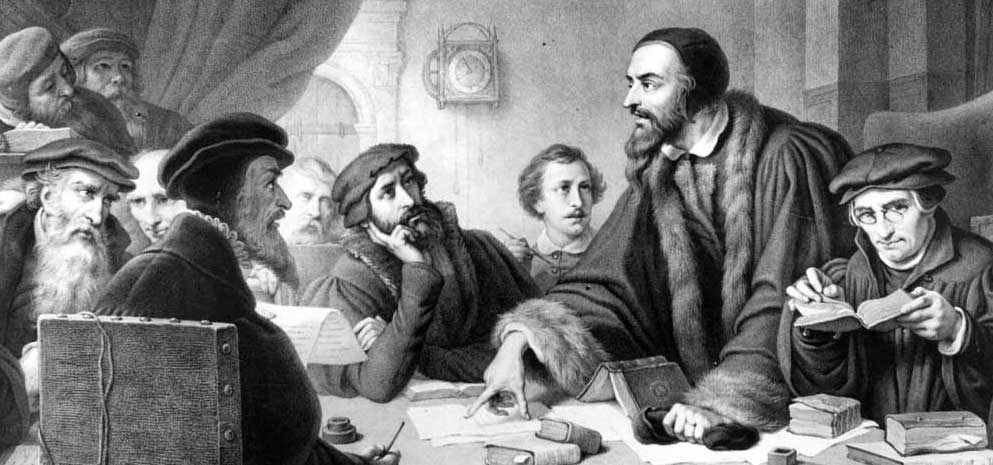
by Bret Capranica | Mar 12, 2014 | Pastoral Ministry
Here are a few more quotes from Manetsch’s book Calvin and His Company of Pastors Regarding Spiritual Counsel and Consolation “Words fail to explain how necessary prayer is. . . . Surely with good reason the Heavenly Father affirms that the only stronghold of safety is in calling upon his name.” Through prayer, Christians are reminded of God’s providential care for them, experience God’s power to heal and help them, and receive assurance of God’s grace to forgive their sins and bring them into eternal life. In sum, Calvin believed, “it is by prayer that we call [God] to reveal himself as wholly present to us.” 290. Goulart’s ten principles to be followed by Christian pastors, or “consolers,” as they apply the medicine of Scripture to the needs of suffering men and women: The pastor should know and have true compassion for the person suffering. The pastor should encourage the ailing Christian to adore the judgment of God and be mindful of his mercy. The pastor should conduct a careful examination of the conscience of the suffering person, probing its condition, deportments, and passions, so as to apply the proper kind of spiritual consolation. The pastor should have at hand a variety of examples of faithful Christians who faced similar afflictions and yet trusted in the grace of God. The pastor should remind the afflicted Christian that other believers have remained faithful as they faced similar, or even worse, trials. The pastor should listen to and affirm what the suffering person says, while gently expanding upon or correcting opinions that are confused or inaccurate. The pastor should encourage the ailing...

by Bret Capranica | Mar 5, 2014 | Pastoral Ministry
Here are a few more notable quotes from Scott M. Manetsch’s book, Calvin’s Company of Pastors: Pastoral Care and the Emerging Reformed Church, 1536-1609. On Church Discipline Calvin insisted that the power of the keys did not give the church the authority to pronounce damnation or salvation – that decision belonged to God alone. Instead, the church’s discipline was always provisional, intended to rescue the wayward in a spirit of mildness and gentleness. In this way, Calvin averred, reformed excommunication was to be distinguished from the Catholic pronouncement of anathema, for whereas the latter “condemns and consigns a man to eternal destruction,” the former warns the sinner of future condemnation and “calls him back to salvation 188-189. Calvin, Beza, and their colleagues believed that ministers exercised the power of the keys in three primary ways. First, the spiritual authority to ‘bind and loose’ was exercised in a general way when ministers preached the gospel in their sermons, announcing God’s righteous judgment upon the wicked and God’s promise of salvation to those who turned to Christ in repentance and faith. Second, the power of the keys was employed more particularly when pastors and lay elders conducted annual household visitations to examine the character and doctrine of church members, or when they admonished sinners in private conferences. Finally, ministers and elders employed the power of the keys through the ministry of the Consistory as they confronted people who were guilty of moral failure and excommunicated from the Lord’s Table those who refused to repent of their error. . . . The power of the keys needed to be exercised with wisdom...

by Bret Capranica | Feb 19, 2014 | Calvinism, Pastoral Ministry
A friend recently recommended I read Scott M. Manetsch’s book, Calvin’s Company of Pastors: Pastoral Care and the Emerging Reformed Church, 1536-1609. How grateful I am for the suggestion. It is a fascinating look into the spiritual life of Geneva during and after Calvin’s public ministry there. Here are a few thoughts from a portion of the book. From the time of John Calvin’s coming to Geneva until the beginning of the seventeenth century, more than 130 pastors participated in what was referred to as Geneva’s Venerable Company of Pastors. These shepherds sought to oversee not only the ongoing work of the Reformation, but the practical shepherding of the churches in and around the city of Geneva. The following are quotes from the book that I have found interesting as to how these shepherds sought to oversee the flock of God among them. So much is the same, little has changed. Regarding one of the final meetings John Calvin had with his colleagues in ministry: . . . he exhorted his pastoral colleagues to be on guard against all religious innovation in the future. “I beg you also to change nothing and to avoid innovation,” Calvin stated, “not because I am ambitious to preserve my own work. . . but because all changes are dangerous, and sometimes even harmful.” 1 On establishing and maintaining right worship: Calvin identified two principal qualities of authentic Christian worship: it is spiritual and it is dependent upon the divine Word. Worship is “spiritual” in that it originates in the ministry of the Holy Spirit who initiates faith in the Christian man or woman and...










